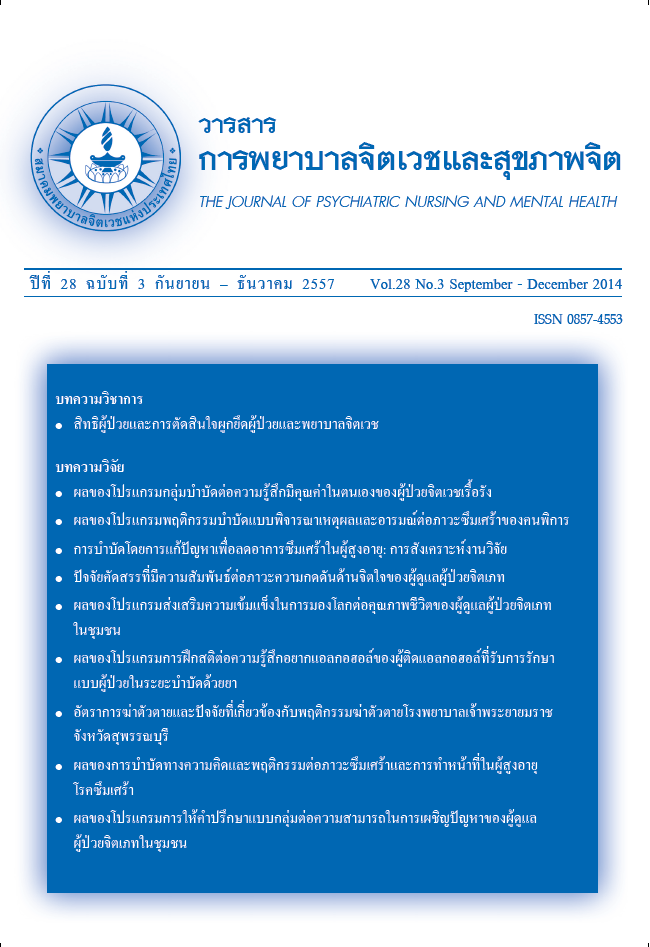ผลของโปรแกรมกลุ่มบำบัดต่อความรู้สึกมีคุณค่าในตนเองของผู้ป่วยจิตเวชเรื้อรัง EFFECT OF GROUP THERAPY PROGRAM ON SELF ESTEEM AMONG CHRONIC PSYCHIATRIC PATIENTS
Main Article Content
บทคัดย่อ
วัตถุประสงค์: เพื่อศึกษาผลของการใช้โปรแกรมกลุ่มบำบัดต่อความรู้สึกมีคุณค่าในตนเองของผู้ป่วยจิตเวชเรื้อรัง
วิธีการศึกษา: เป็นงานวิจัยกึ่งทดลอง กลุ่มตัวอย่างเป็นผู้ป่วยจิตเวชเรื้อรัง จำนวน 30 คนที่เข้ารับการรักษาในโรงพยาบาลจิตเวชแห่งหนึ่ง เครื่องมือที่ใช้ในการวิจัย ได้แก่ แบบวัดความรู้สึกมีคุณค่าในตนเอง และชุดโปรแกรมการทำกลุ่มบำบัด กลุ่มทดลองได้รับการเข้ากลุ่มกิจกรรมบำบัดจำนวน 12 กิจกรรม ใช้เวลา 60 นาที/ครั้ง ส่วนกลุ่มควบคุมได้รับการดูแลตามมาตรฐานปกติ การเก็บข้อมูลดำเนินการในระหว่างเดือน ระหว่างเดือนพฤษภาคม ถึง เดือนมิถุนายน พ.ศ. 2556 การวิเคราะห์ข้อมูลใช้สถิติบรรยาย(ค่าเฉลี่ย ส่วนเบี่ยงเบนมาตรฐาน) t-test dependent และ t-test independent
ผลการศึกษา: พบว่า ก่อนการทดลองพบว่าคะแนนความรู้สึกมีคุณค่าในตนเองของกลุ่มทดลองและกลุ่มควบคุมไม่แตกต่าง หลังการทดลองพบว่าในกลุ่มทดลองและกลุ่มควบคุมมีคะแนนความรู้สึกมีคุณค่าในตนเองสูงกว่าก่อนการทดลองอย่างมีนัยสำคัญทางสถิติ และพบว่าหลังการทดลองกลุ่มทดลองมีคะแนนความรู้สึกมีคุณค่าในตนเองสูงกว่ากลุ่มควบคุมอย่างมีนัยสำคัญทางสถิติ
สรุป: การส่งเสริมความรู้สึกมีคุณค่าในตนเองสามารถเสริมสร้างได้ในกลุ่มผู้ป่วยจิตเวชเรื้อรัง และโปรแกรมกลุ่มบำบัดเป็นทางเลือกหนึ่งในการบำบัดเพื่อเพิ่มความรู้สึกมีคุณค่าในตนเองของผู้ป่วยเรื้อรัง
Objective: To study the effect of group therapy program on self-esteem in chronic psychiatric patients.
Methods: This study was a quasi-experimental research. The sample was 30 chronic psychiatric patients from a psychiatric hospital. The research instruments consisted of a self esteem questionnaire and a group therapy program. The experimental group received twelve sessions of group therapy program, 60 minutes/session, while a control group received standard care. The data were collected during May – June 2013. Data were analyzed using mean, standard deviation, dependent t-test, and independent t-test.
Results: There was no significant difference in baseline scores of self-esteem between the experimental group and the control group. In the experimental group, the self- esteem scores increased significantly after finishing the program and also the self - esteem scores in the control group increased significantly after finishing the program. Furthermore, the self- esteem scores of experimental group were significantly higher than the self-esteem scores of control group after finishing the program.
Conclusion: This research suggests that self-esteem in chronic psychiatric patients could be enhance. The self- esteem program is one of alternative group therapy that can be used to increase self-esteem in chronic psychiatric patients.
Article Details
บทความที่ได้รับการตีพิมพ์แล้ว เป็นลิขสิทธิ์ของสมาคมพยาบาลจิตเวชแห่งประเทศไทย


